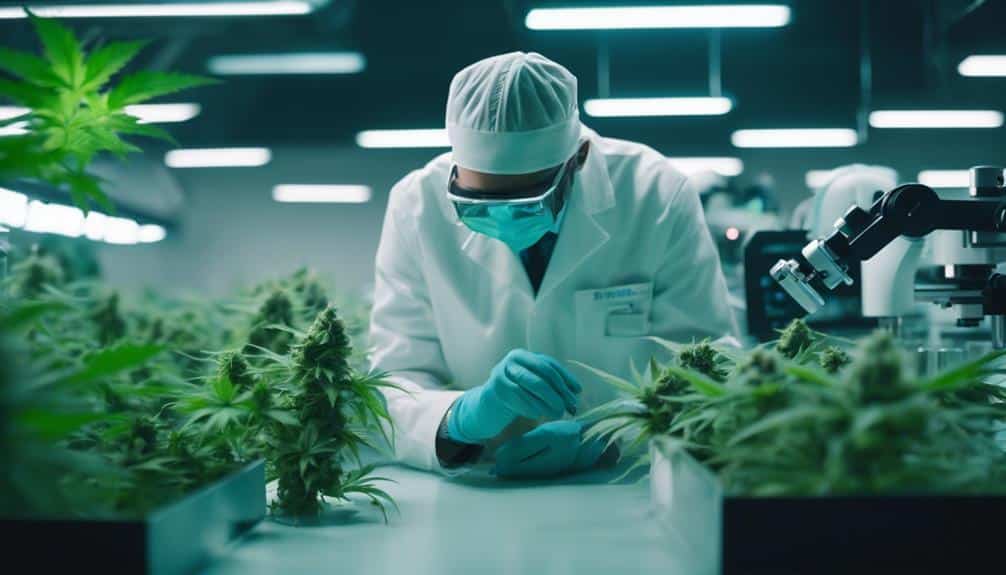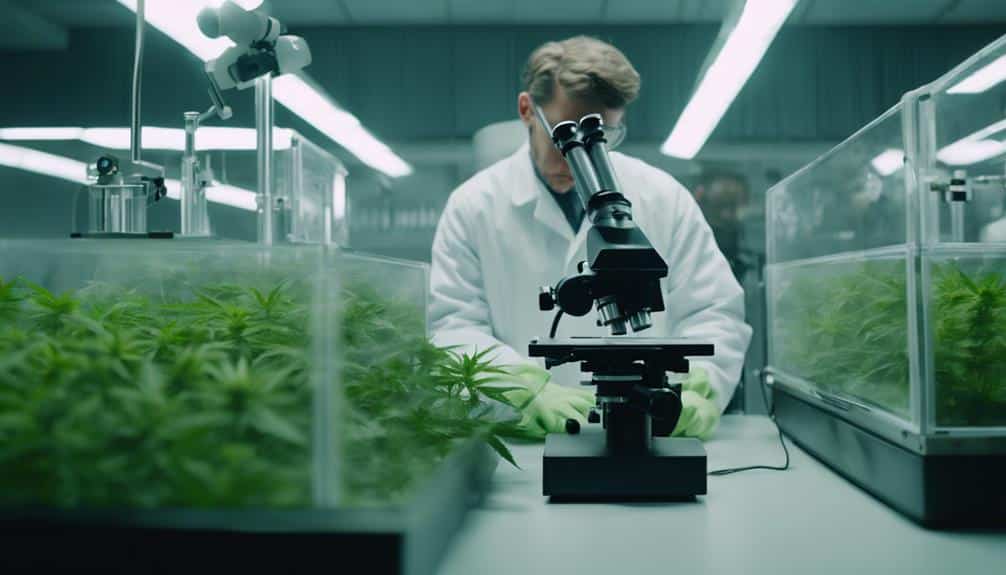Imagine standing on the brink of a new era in Maryland’s health care, where medical marijuana is not just an alternative but a mainstream treatment option. You might be curious about how this evolving landscape will affect you. The progress in medical marijuana research is likely to bring forward more tailored and evidence-based treatments. As innovation continues, we can expect refined cannabinoid therapies providing relief for chronic pain, nausea, and anxiety. But what impact will this have on patient access, and what role does research funding play? There’s much to explore, and staying informed is key.
Understanding Medical Marijuana

To comprehend the future of medical marijuana research in Maryland, it’s essential first to understand what medical marijuana is and how it interacts with the human body at a physiological level. Medical marijuana refers to using parts of the Cannabis plant or derivative products for managing health conditions. It’s Cannabinoid Pharmacology—the study of how chemical compounds in cannabis influence bodily functions—that’s crucial in understanding its therapeutic applications.
Cannabis contains over 100 cannabinoids; two are particularly noteworthy: THC (tetrahydrocannabinol) and CBD (cannabidiol). THC is the psychoactive component that gives users a ‘high,’ while CBD is non-psychoactive and has been linked to various therapeutic benefits. These cannabinoids interact with your body’s endocannabinoid system (ECS), a complex cell-signaling system involved in regulating functions like mood, sleep, and pain.
Through this interaction, cannabinoids can alter the release of neurotransmitters in the brain, affecting how messages are sent, received, and processed. This ability to influence the ECS is why medical marijuana shows promise in treating conditions like chronic pain, epilepsy, and multiple sclerosis. Understanding this mechanism is paramount for harnessing its potential and expanding its therapeutic applications.
Current Legislation in Maryland
While you’re getting to grips with the science behind medical marijuana, it’s also crucial to understand Maryland’s current legislation surrounding its use and distribution. Maryland has taken progressive steps towards accepting medical marijuana; however, the journey hasn’t been without legislative challenges.
In 2014, the state legalized medical marijuana; however regulatory progress has been slow. The Natalie M. LaPrade Medical Marijuana Commission—responsible for regulating and overseeing the program—faced a daunting task of balancing patient needs with safety and control.
Patients can’t grow their own plants and must purchase from licensed dispensaries. Doctors, nurse practitioners, dentists, podiatrists, and nurse midwives can recommend medical marijuana—significantly broadening patient access—but they must register with the Commission which can be a hurdle for some professionals.
While strides have been made by the state there are still challenges to address such as that current law doesn’t protect users from employment discrimination. These legislative challenges reflect a broader national debate about where medical marijuana fits into society.
The Evolution of Cannabis Research

Delving into the evolution of cannabis research, you’ll find a fascinating, albeit complex journey that has significantly shaped our current understanding of medical marijuana’s potential benefits and risks. Early studies primarily focused on the psychoactive properties of cannabis, leading to the discovery of THC—the main psychoactive compound.
With more advanced research methods, scientists uncovered a complex network within our bodies called the endocannabinoid system. This system—intimately tied to our physiological processes—interacts with cannabinoids like those found in cannabis. This discovery spurred a new wave of research focusing on cannabinoid biochemistry.
Digging deeper, you’ll uncover how genetic engineering has played a crucial role in cannabis research. Scientists have genetically modified cannabis strains to produce higher concentrations of specific cannabinoids. This has resulted in strains that are more effective for certain medical conditions, allowing for more targeted treatments.
The evolution of cannabis research is testament to how far we’ve come in understanding this complex plant. It’s a story filled with scientific breakthroughs and persistent curiosity—an ongoing journey shaping our understanding and application of medical marijuana.
Potential Health Benefits Explored
Turning our attention to the potential health benefits of medical marijuana requires considering the extensive breadth of research conducted in this area. Studies on cannabinoid therapies have demonstrated promising results across diverse health conditions by leveraging complex marijuana pharmacology for therapeutic effects.
You might be surprised to learn that medical marijuana isn’t just about smoking or getting high—it’s a multifaceted treatment offering relief from chronic pain, nausea, anxiety among other ailments. Scientists continually uncover new findings about the plant’s active components and their interactions with our bodies’ natural systems.
In particular, cannabinoids—the active compounds in cannabis—have been extensively researched. These substances interact with the endocannabinoid system in our bodies, influencing a variety of physiological processes. This interaction is what makes cannabis a potent tool for pain management, appetite stimulation, and even epilepsy control.
Therefore, as research progresses in Maryland and beyond, patients can expect more refined and effective cannabinoid therapies. The future certainly holds promise for those seeking relief through medical marijuana.
Controversies and Concerns

Despite the promising potential of medical marijuana, it’s important to acknowledge the controversies and concerns surrounding its use and research. Legal ramifications are a significant issue—while Maryland has legalized medical marijuana, it’s not federally recognized. This discrepancy can cause complications for patients, researchers, and healthcare providers alike—potentially leading to legal consequences.
Public perception is another pressing concern. Despite growing acceptance of medical marijuana there’s still considerable stigma attached to its use. Many people are skeptical about its medical benefits or concerned about potential misuse which could impact patient access and further research.
Furthermore, lack of standardization in marijuana strains and dosages adds complexity—it’s difficult to guarantee consistent results in both research and treatment without uniformity. This uncertainty can fuel controversy further posing challenges to healthcare professionals looking to incorporate medical marijuana into their practice.
Last but not least there’s concern over long-term effects—while initial studies show promise the long-term effects of medical marijuana use are largely unknown. This ambiguity creates caution which can affect both adoption and further exploration of this treatment option.
Impact on Mental Health Treatments
When considering the expanding field of mental health treatments, it’s crucial to examine the potential impact of medical marijuana. Exploring cannabinoid psychopharmacology reveals a promising yet complex landscape.
Cannabinoids—the active compounds in medical marijuana—have shown potential in managing mental health conditions. Studies suggest they may modulate emotional processing, stress response, and sleep regulation—areas often disrupted in mental disorders. However, therapeutic dosages and precise mechanisms of action remain areas of ongoing research.
It’s important to acknowledge the variable effects of cannabinoids. Everyone’s endocannabinoid system—the body’s natural system that interacts with cannabis—is unique. Therefore what works for one patient may not work for another, and adverse effects may occur. This underlines the need for personalized treatment plans and careful monitoring.
In pursuit of improved mental health treatments healthcare providers must navigate the evolving landscape of medical marijuana. By staying informed and adopting a patient-centered approach you can harness potential benefits while mitigating risks. Remember, the goal isn’t merely to adopt new therapies but to integrate them responsibly into comprehensive care.
Future Predictions for Maryland Patients

Looking ahead it’s clear that thousands of Maryland patients stand to benefit significantly from advances in medical marijuana research and regulation. The future is geared towards personalized evidence-based treatments offering more options for patients.
Patient Advocacy groups in Maryland are working tirelessly to facilitate access to medical marijuana treatment. Their efforts aim to make treatment more affordable, advocate for insurance coverage, and ensure that patients’ rights are protected.
Research funding is another crucial factor shaping the future. Increased funding will allow for more extensive rigorous studies generating robust evidence about therapeutic benefits and potential risks of medical marijuana—enabling physicians to make better-informed decisions.
Moreover advancements in research methodologies will allow for more precise dosage guidelines reducing the risk of adverse effects. This ensures optimal therapeutic benefits while minimizing potential risks.
Conclusion
Looking ahead anticipate a groundbreaking shift in medical marijuana research in Maryland. The future holds potential for tailored treatments refined cannabinoid therapies and exact dosage guidelines marking the dawn of a new chapter. However it’s crucial to bear in mind that while potential benefits are enormous controversies and concerns persist. Stay informed stay cautious and you’ll be part of a historic change in medical marijuana treatment.
I invite you to learn more about this exciting new world of medical marijuana research by visiting us at Fells Point Cannabis Docs of Maryland. We’re always here to answer your questions provide guidance and help you navigate this evolving landscape. If it’s easier feel free to give us a call—we’re eager to share our knowledge and insights with you. Keep in mind our doors are always open—we’re here to help you on this journey so come on by we look forward to meeting you!
